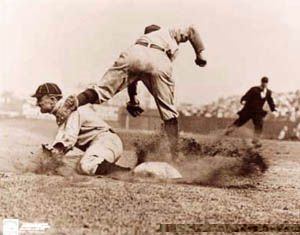How Cobb Played the Game - Part 1: His Rookie Experiences - James Kossuth
Cobb arrived in Detroit on 29 August 1905 after a three-day train ride from Georgia. He made his debut the next day against Jack Chesbro, ace of the New York Americans (later called the Yankees). Immediately Cobb drew attention to himself as a precocious rookie by swinging three bats in the on-deck circle. The reaction to him doing so indicates that he was probably among the first players to swing multiple bats in the on-deck circle. He showed determination and character in his first major league at-bat, driving a two-strike pitch from the 40-game winner into center field for a double.
In his autobiography Cobb quotes from the write-up in the next day's Detroit Free Press:
Cobb got away well. For a young man anxious to get along in the world, it was not an auspicious situation as he faced Mr. Chesbro, the American League's finest twirler. In addition, Tyrus had the back luck to confront Chesbro on two occasions when two men were out and a man waiting to score—a base hit being the only thing of value. First time up, Chesbro poured two fast strikes past the uneasy lad. But then the Georgian whacked the next one over Eddie Hahn's head and off the center field wall for a delightful double that scored his man. Second time up, he drew a walk and was thrown out stealing. In the field, he was adequate.Tyrus was wall-received and may consider a two-base pry-up a much better career opener than usually comes a young fellow's way (Cobb, 18-19).
The rest of his rookie season did not go as smoothly for Cobb, however. The very next day he slid headfirst into second base, only to have Kid Elberfeld, the Highlanders' second baseman, dig his knee into the back of Cobb's neck, grinding his face in the dirt. That was the last time Cobb slid headfirst into a base. The next time the Tigers and Highlanders squared off, Cobb slid feetfirst into Elberfeld, knocking him on his backside. Instead of outrage, Elberfeld reacted with grace and sportsmanship, reports Cobb, pleased that the rookie had so quickly learned a lesson. Cobb only had to be told once.
Cobb had consistency problems with his glove, which plagued him early on with the Tigers. On some days he was brilliant in the field, and on others it seemed like he was playing with a bag of popcorn in his hand.
Overall, Cobb's first season in the majors, short as it was, showed enough promise for the Tigers to sign him to a lucrative (at that time) $1500 contract for the 1906 season.
In his autobiography Cobb quotes from the write-up in the next day's Detroit Free Press:
Cobb got away well. For a young man anxious to get along in the world, it was not an auspicious situation as he faced Mr. Chesbro, the American League's finest twirler. In addition, Tyrus had the back luck to confront Chesbro on two occasions when two men were out and a man waiting to score—a base hit being the only thing of value. First time up, Chesbro poured two fast strikes past the uneasy lad. But then the Georgian whacked the next one over Eddie Hahn's head and off the center field wall for a delightful double that scored his man. Second time up, he drew a walk and was thrown out stealing. In the field, he was adequate.Tyrus was wall-received and may consider a two-base pry-up a much better career opener than usually comes a young fellow's way (Cobb, 18-19).
The rest of his rookie season did not go as smoothly for Cobb, however. The very next day he slid headfirst into second base, only to have Kid Elberfeld, the Highlanders' second baseman, dig his knee into the back of Cobb's neck, grinding his face in the dirt. That was the last time Cobb slid headfirst into a base. The next time the Tigers and Highlanders squared off, Cobb slid feetfirst into Elberfeld, knocking him on his backside. Instead of outrage, Elberfeld reacted with grace and sportsmanship, reports Cobb, pleased that the rookie had so quickly learned a lesson. Cobb only had to be told once.
Cobb had consistency problems with his glove, which plagued him early on with the Tigers. On some days he was brilliant in the field, and on others it seemed like he was playing with a bag of popcorn in his hand.
Overall, Cobb's first season in the majors, short as it was, showed enough promise for the Tigers to sign him to a lucrative (at that time) $1500 contract for the 1906 season.
Article no longer available on the web.




